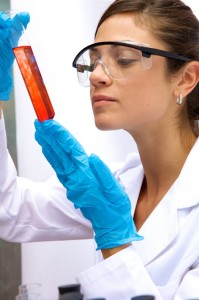
by theglamscientist | | cosmetic chemists, cosmetic science, lead, parabens, preservatives, research |

With all the controversy and bad press looming in the cosmetic industry, I thought it was important to speak as both a consumer and a cosmetic chemist. I have had the privilege of following several forum style discussions regarding the safety of cosmetics and personal care products. In these discussions, both scientists and non-scientists provide their “two cents”. Normally, a sensationalist begins the discussion with wild claims like “Women put 515 chemicals on their bodies everyday!” or “There’s lead in your lipstick and you’re eating 7 lbs of it a year!”. Think I’m being facetious? I couldn’t be more serious. Of course, this is when all the scientists join in with our facts and research, etc because we hate to see the industry being bashed and shown in a negative light.
The Scientist’s Brain
Scientists realize that consumers are often skeptical and that they are being fed a lot of misinformation. What the general public doesn’t realize is that scientists are by far the most skeptical beings… ever. Our minds are wired to question everything and believe nothing until we have seen the research or performed the research ourselves… it’s the scientific method. Once we have the facts, we will fight and argue tirelessly to inform those who don’t believe. In the case of the cosmetic industry, some of these arguments and fights occur publicly. It may appear that the scientists are picking on “the little guy”, as we often must take our stand against individuals like sales reps from MLM companies or “all natural” companies. The problem is, these individuals rarely know the science behind the ingredients that we use– both natural and synthetic.
My Note to the Consumer
Be careful what you believe. It’s perfectly ok to be skeptical, but be fair with your skepticism. I urge you to not only question claims made by the cosmetic industry, but the claims made by radicals and special interest groups as well. Keep in mind, the research and development department of any major cosmetic company is run by various scientists ie chemists, biologists, chemical engineers, etc. With the “natural” cosmetic companies, not so much. Don’t get me wrong, this post is not to bash indie beauty companies in any way. On the contrary, it is meant to bring about awareness and to say “Shame on you.” to those companies whose marketing strategy is to shed a negative light on larger, more established companies.
As with any industry, there are some snakes in the grass. There are plenty of cosmetics on the market that make claims they can’t live up to. Those products belong to both big brand manufacturers and small cosmetic companies alike. Learn to read your ingredients lists and familiarize yourself with which ingredients are natural and which are synthetic. If you want to know if a product is likely to work, feel free to ask me. Keep in mind, product claims are largely made by marketing departments, not R&D.
Final Points
1. Research shows there is no harm in parabens.
2. Water based products NEED preservatives. If you see water and no preservative, be afraid… be very afraid!
3. Preservatives are your friend… they keep your products safe from nasty little bacterial creatures.
4. Lead is not purposely included in your lipstick as a secret ingredient. Lead is a naturally occurring metal and can inadvertently be introduced to not only your cosmetics, but your food and drink as well. Albeit in TRACE amounts, as it is only found in nature in trace amounts.
5. Cosmetic Scientists use the SAME cosmetics that we market to the general public. We put them on our skin and our children’s skin. Sorry to break it to you, but there is no secret society for cosmetic scientists that makes all the “good” products that we keep to ourselves.
6. The nature of any scientist is to research, test, research, test, research some more, test and then share our findings. This is no different for the cosmetic industry.
Knowledge is Hotness, here’s to the Glam Life!
by theglamscientist | | Colipa, p-hydroxybenzoic acid, parabens, preservatives |
This past February, I did a post discussing parabens– what they are, what the rumors are and whether or not the rumors were true. You can find that post here: Parabens
New research has been released that shows parabens don’t cause any hormonal activity in the body. Florian Schellauf of Colipa (The European Cosmetics Association) recently presented research regarding propyl- and butylparabens that were introduced both orally and topically in laboratory rats. The study showed that the parabens are significantly absorbed orally, but only partially through the skin. Although there is some absorption through the skin, the research shows that the parabens are fully metabolized BEFORE they reach the blood stream. As proof of this finding, blood plasma tests were conducted that showed only the presence of the paraben metabolite p-hydroxybenzoic acid (pHBA) not the parabens themselves. These findings held true whether the parabens were introduced orally, dermally or subcutaneously (by injection just beneath the skin’s surface). Thus far, pHBA is not known to have any estrogenic effects and can be found in our food and plant life naturally. That means, you are already ingesting the paraben metabolite more than likely on a daily basis. IF pHBA is causing trouble via your cosmetics, then it would be causing problems via the food you eat too. Think about it…
So the final word on this research study as put forth by Colipa is:
“The study confirms the results of a number of research studies, which concluded from their work that parabens are metabolised rapidly and to a large extent in living organisms and therefore cannot exhibit any adverse effects,” –Colipa.
Based on the science, I still see no harm in the use of parabens– especially in the extremely low concentrations that are used in cosmetic preparations. We shall continue to see how the story unfolds. For now, if you are a consumer that has chosen to steer clear of parabens, there’s no harm in caution. Just know, the science is on their side.
For more information on this study, view the original article here: New data on parabens
by theglamscientist | | breast cancer awareness, Cosmetic Ingredients Review, FDA, parabens, preservatives |
I think I can keep this short and sweet. In recent years there has been a big fuss made about parabens in cosmetic applications. So what’s it all about? Parabens are preservatives used to protect your personal care products from the growth of harmful microorganisms. Most personal care products have water as one of the main ingredients. Any product that contains water can grow some really nasty stuff so preservatives are a must. Sidebar– while I’m an advocate and producer of natural personal care products, I firmly believe in the use of some sort of preservative system. I do not think it is safe to sell natural products without preservatives because the average consumer does not consider expiration dates.– The most commonly used parabens are: methylparaben, propylparaben and butylparaben. They are usually used together to minimize the amount of preservatives necessary to achieve the same end result.
Parabens have been confirmed to be safe by both the FDA and the Cosmetic Ingredients Review expert panel in the concentrations used (0.01-0.3%). The problem is parabens have been found in the breast tissue of breast cancer patients. So the premise is; because parabens are in breast cancer tissue, parabens must cause breast cancer…. not necessarily true. In the studies conducted, normal breast tissue was not tested for the presence of parabens. So who knows, they may exist naturally! Parabens also exhibit estrogen like behavior. Estrogen activity has been linked to the occurance of breast cancer. However, parabens have much lower estrogen levels than what is naturally found in the human body.
Armed with this info, its now up to you to decide if you believe the hype. As a scientist, research carries a whole lot of weight to me. Personally, I am not alarmed by the ‘possibility’ of parabens causing breast cancer… but just in case, you won’t find those preservatives in my line of products.


